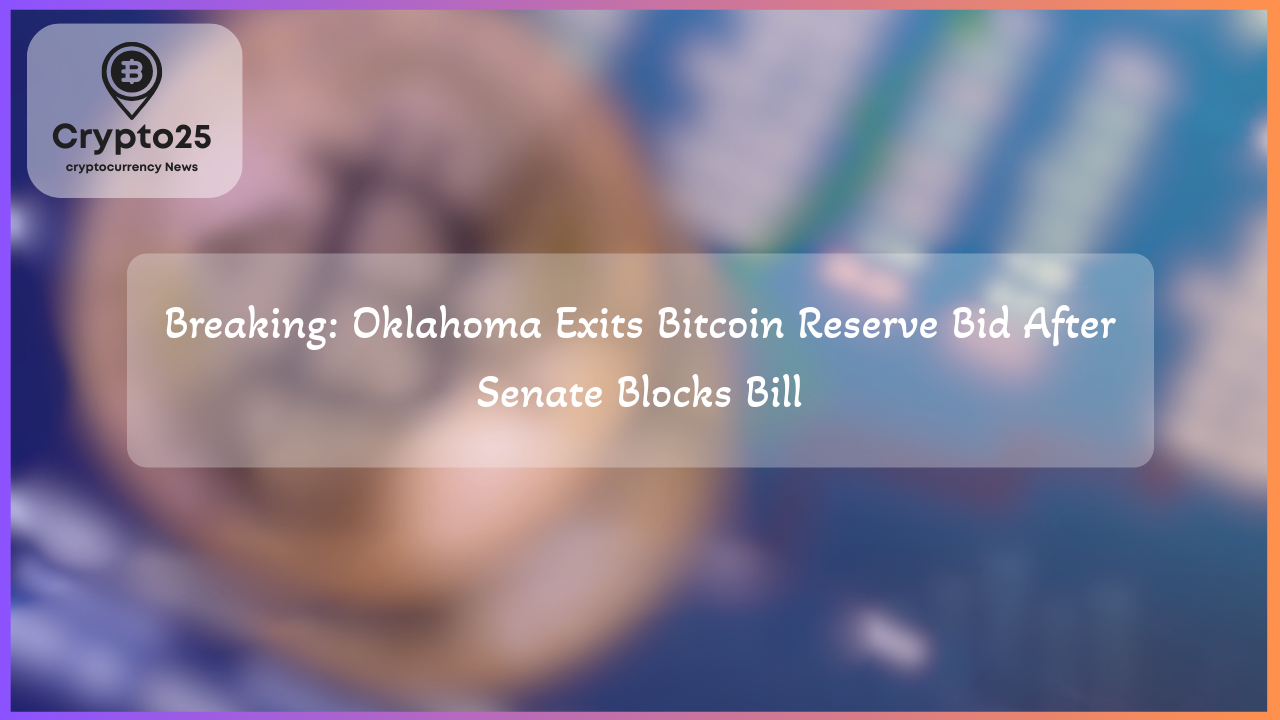
Oklahoma has officially stepped away from the dynamic race to establish a Strategic Bitcoin Reserve (SBR), marking a notable shift in its approach to integrating Bitcoin into public finance. This decision comes after a critical bill, known as the Strategic Bitcoin Reserve Act, failed to advance in the state legislature. The move highlights the complexities of adopting cryptocurrencies at the state level while signaling broader opportunities elsewhere.
## Oklahoma Ends Its Quest for a Strategic Bitcoin Reserve
Oklahoma’s ambitions to establish a Strategic Bitcoin Reserve came to a halt on April 15 when House Bill 1203, or the Strategic Bitcoin Reserve Act, was defeated in the Senate Revenue and Taxation Committee by a narrow 6-5 vote. While the proposal had earlier garnered impressive support in the state’s House of Representatives with a 77-15 vote, the Senate committee’s outcome reflected unresolved divisions over its execution and implications.
Senator Christi Gillespie’s late decision to support the initiative after initially opposing it symbolized the growing conversation around Bitcoin in government circles. However, her vote alone could not secure the bill’s success. This decision places Oklahoma among other states, such as Montana, South Dakota, and Pennsylvania, where similar efforts have been shelved or rejected.
The Strategic Bitcoin Reserve Act aimed to authorize Oklahoma’s state treasurer to invest public funds into Bitcoin and other select stablecoins. However, limitations within the bill stipulated a minimum market capitalization requirement of $500 billion, a threshold only Bitcoin currently meets. With Bitcoin’s valuation hovering at approximately $1.6 trillion, the cryptocurrency has established itself as a dominant asset, offering states a potential hedge against inflation and a tool for diversifying reserves.
| Title | Details |
|---|---|
| Market Cap | $1.6 Trillion (Bitcoin) |
| State House Vote | 77-15 in Favor |
| Senate Committee Vote | 6-5 Against |
## Strategic Bitcoin Reserve Momentum Continues Nationwide
Although Oklahoma opted out, interest in Bitcoin reserves shows no signs of waning in the United States. Currently, 21 states are actively exploring similar initiatives, placing their trust in Bitcoin as a globally recognized digital asset. States such as Arizona, Texas, and New Hampshire have emerged as frontrunners, positioning themselves at the forefront of public-finance innovation.
According to data from Bitcoin Laws, there are 117 pro-Bitcoin bills under consideration across the U.S. Of these, 47 bills specifically address Strategic Bitcoin Reserve initiatives spanning 26 states. This trend demonstrates a rapidly changing legislative landscape, where governments are exploring blockchain technology to modernize financial infrastructure.
Globally, Bitcoin continues to cement itself as a viable option for institutional and governmental reserves, drawing comparisons to traditional assets like gold. Its high liquidity and decentralized nature offer governments an alternative to fiat-heavy reserves amid inflationary pressures. While Bitcoin carries volatility risks, its potential as a long-term store of value sparks debate among policymakers worldwide.
## Federal Discussions on Bitcoin Reserves Gain Traction
Beyond state-level activities, federal interest in Bitcoin reserves is steadily gaining traction. Bo Hines, Executive Director of the Presidential Council of Advisers on Digital Assets, confirmed that federal discussions are underway to fund a potential Bitcoin reserve without increasing the nation’s budget. Several mechanisms are under evaluation, including the use of tariff revenues and the revaluation of gold-backed Treasury certificates.
These developments underscore the growing recognition of Bitcoin’s strategic importance in the global economy. For U.S. policymakers, the move to integrate Bitcoin into public finance represents a broader shift toward digital assets as a critical component of financial resilience and national economic strategy.
As Oklahoma exits the Bitcoin reserve race, attention turns to states and countries actively embracing cryptocurrency. The global momentum surrounding Bitcoin emphasizes its potential to disrupt traditional finance, offering new opportunities for sustainable economic policy. Looking ahead, the conversation around Bitcoin is likely to intensify, keeping states, federal governments, and global markets closely engaged with its evolution as an asset.
